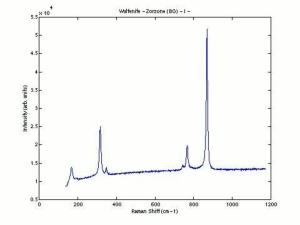Difference between revisions of "Molybdenum"
m (Text replace - "== Authority (list of all sources checked for information on this subject)==" to "== Sources Checked for Data in Record ==") |
|||
| Line 50: | Line 50: | ||
Web Elements: [http://www.webelements.com/webelements/elements/text/Mo/key.html Website] | Web Elements: [http://www.webelements.com/webelements/elements/text/Mo/key.html Website] | ||
| − | == | + | == Sources Checked for Data in Record == |
* ''Chemical & Engineering News'', American Chemical Society, Washington DC, 81 (36) , Sept. 8, 2003 Comment: Philip Mitchell, p. 108; states discovered by Scheele in 1778 | * ''Chemical & Engineering News'', American Chemical Society, Washington DC, 81 (36) , Sept. 8, 2003 Comment: Philip Mitchell, p. 108; states discovered by Scheele in 1778 | ||
Revision as of 11:47, 29 April 2016
Description
A silvery-white metallic element. Molybdenum occurs in the earth's crust in concentrations of 1-1.5 ppm. It is obtained from molybdenite and wulfenite ores and also as a by-product of Copper production. Molybdenum was first discovered by Carl William Scheele in 1778 and isolated by Peter Hjelm in 1782. Molybdenum is very resistant to corrosion, has high electrical conductivity and can withstand high temperatures. Metallic molybdenum is used in the manufacture of hardened steels, tools, boiler plate, rifle barrels, propeller shafts, x-ray tubes, electrical contacts, filaments, and glass-to-metal seals.
Synonyms and Related Terms
Mo; Molybdeen (Ned.); molybdène (Fr.); Molybdän (Deut.); molibdeno (It., Esp.); molibdénio (Port.); molybden (Sven.); molybdos (Gr.); molybdenite; wulfenite
Other Properties
Flame color is green-yellow. Insoluble in water, dilute hydrochloric acid and alkalis. Reacts with nitric acid and sulfuric acid.
| Composition | Mo (atomic no. 42) |
|---|---|
| CAS | 7439-98-7 |
| Mohs Hardness | 5.5 |
| Melting Point | 2622 |
| Density | 10.28 |
| Molecular Weight | atomic wt = 95.94 |
| Boiling Point | 4639 |
Hazards and Safety
Highly toxic.
Mallinckrodt Baker: MSDS
Additional Information
Web Elements: Website
Sources Checked for Data in Record
- Chemical & Engineering News, American Chemical Society, Washington DC, 81 (36) , Sept. 8, 2003 Comment: Philip Mitchell, p. 108; states discovered by Scheele in 1778
- Richard S. Lewis, Hawley's Condensed Chemical Dictionary, Van Nostrand Reinhold, New York, 10th ed., 1993
- Van Nostrand's Scientific Encyclopedia, Douglas M. Considine (ed.), Van Nostrand Reinhold, New York, 1976
- Random House, Webster's Encyclopedic Unabridged Dictionary of the English Language, Grammercy Book, New York, 1997
- The Merck Index, Martha Windholz (ed.), Merck Research Labs, Rahway NJ, 10th edition, 1983 Comment: entry 6317; discovered by Scheele in 1778 and isolated by Hjelm in 1782
- The American Heritage Dictionary or Encarta, via Microsoft Bookshelf 98, Microsoft Corp., 1998
- Wikipedia, the free encyclopedia, at http://www.wikipedia.com Comment: http://en.wikipedia.org/wiki/Molybdenum (Accessed Sept. 10, 2005)
- G.S.Brady, Materials Handbook, McGraw-Hill Book Co., New York, 1971 Comment: p. 516
- Website address 1 Comment: Web Elements at http://www.webelements.com/webelements/elements/text/Mo/key.html states discovered by Scheele in 1782


